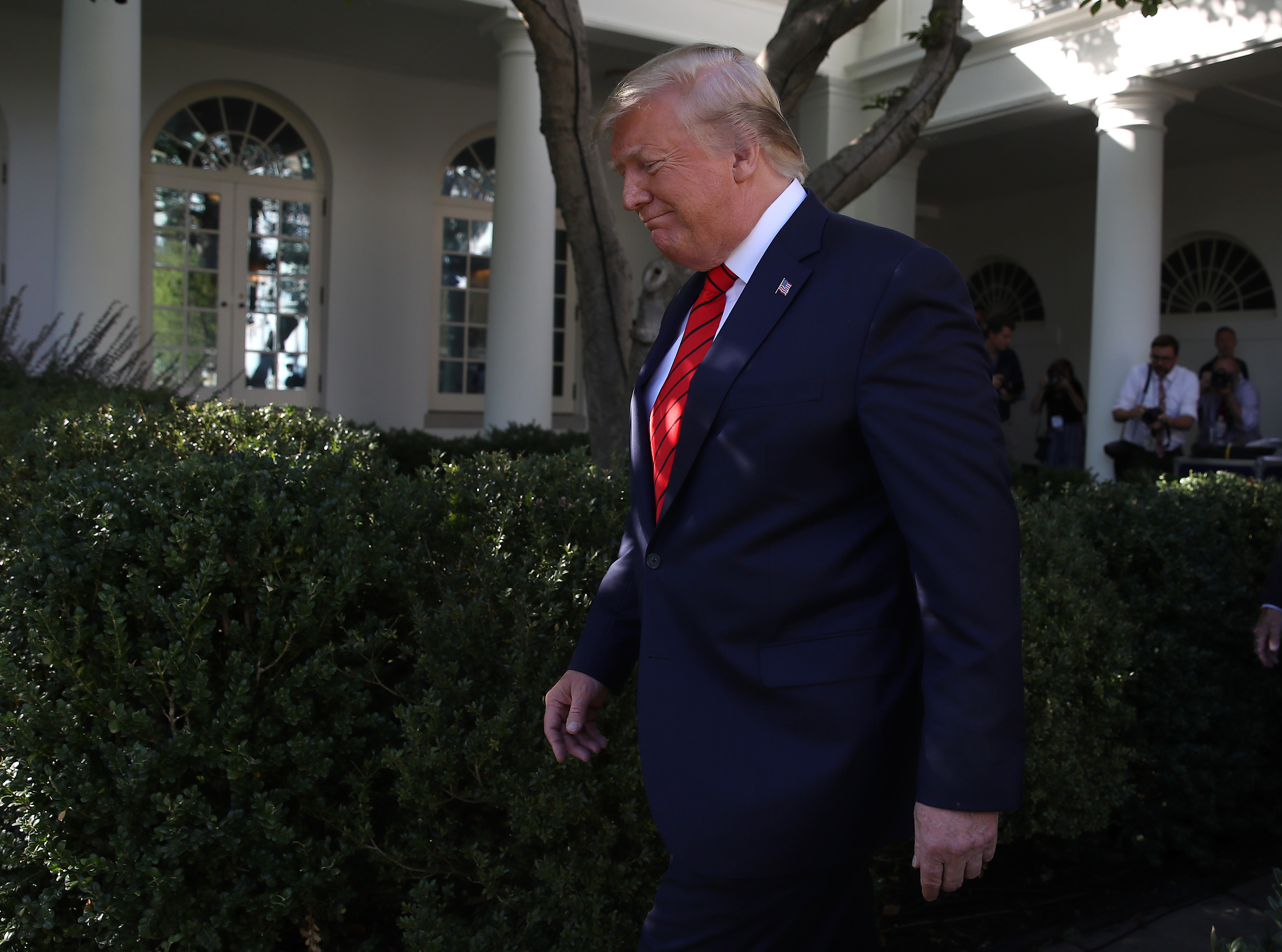 U.S. President Donald Trump walks into the Rose Garden for an event to honor the 2019 Stanley Cup Champions, St. Louis Blues in the Rose Garden at the White House on October 15, 2019 in Washington, DC. (Photo by Mark Wilson/Getty Images)
U.S. President Donald Trump walks into the Rose Garden for an event to honor the 2019 Stanley Cup Champions, St. Louis Blues in the Rose Garden at the White House on October 15, 2019 in Washington, DC. (Photo by Mark Wilson/Getty Images) Like everything else in American politics, the state of President Donald Trump’s impeachment depends almost entirely on what you want it to be. If you are a Trump-hater, you believe that the proceedings to date have been extremely damaging to the president. You would be right. If you are a Trump loyalist, you know that the prospects of him being removed from office as a result of impeachment are even smaller than they were a month ago. And you would be right, too.
How can this be? Evidence that Trump was willing to withhold political and military support to persuade the leaders of Ukraine to investigate one of his political rivals has steadily accumulated. Yet at the same time, opposition to impeachment among Trump’s allies has solidified. Such is life in a hyper-polarized America. The vast majority of Americans can be spoon-fed news, information and opinion that specifically catered to their existing predispositions and reinforced their existing beliefs. As a result, few minds are going to change on either side without a cataclysmic occurrence.
The late Sen. Daniel Patrick Moynihan famously said, “Everyone is entitled to his own opinion, but not to his own facts.” We should now file that relic from a pre-digital era alongside other charming 20th-century artifacts such as eight-track tape players and rotary phones. In today’s wired society, every social media user believes they are entitled to their own facts, which then allows them to borrow their opinions from the nearest convenient source. The result: Trump’s shrunken but hardened base of support is likely to be more than sufficient protection for him to avoid conviction.
When will the impeachment conclude? The answer for Democrats is: Not soon enough.
It is entirely possible that in the coming weeks a piece of information regarding the president’s conduct will become public that is so odious it will force 20 Republican senators to vote to remove a president of their own party from office. But based on the existing base of knowledge, it’s hard to see a result for Trump other than impeachment by the Democratic House and survival courtesy of the GOP Senate.
Given that foregone conclusion, the question now becomes one of timing. Exactly when will the impeachment proceedings conclude, allowing the political portion of the nation’s attention to shift to the 2020 election? The answer for Democrats is: Not soon enough.
The successful Democratic strategy in last year’s midterm elections was predicated on the discipline of their House candidates to focus their messaging not on Trump but on kitchen table issues like jobs and health care. Democratic presidential hopefuls have been following that approach for the last several months. But in recent weeks, their policy pronouncements have been largely overshadowed by the impeachment debate. House Speaker Nancy Pelosi had made it clear that she wanted the proceedings to be completed by the end of the year, but as the investigations become more complicated, the timeline continues to expand.
Right now, the most accelerated calendar would allow for a House vote sometime in December. But Senate Majority Leader Mitch McConnell, who likes Trump’s judicial appointments slightly more than he dislikes Trump, has indicated that the Senate trial would last approximately six additional weeks, thereby diverting voter attention from the Democratic primary and requiring the six senators running for president to spend those weeks in Washington rather than Iowa and New Hampshire.
The Democratic fallback hope is that the impeachment drama will serve as a motivational tool to excite their voters to turn out in great numbers, as was the case in the recent elections in Kentucky and Louisiana. It’s also possible that the revelations from impeachment cast such a cloud over Trump that — even while his base remains loyal — the rest of the electorate will be so appalled that they will turn him out next November.
But the original Democratic plan was to get impeachment out of the way so their candidates could take center stage. For better or worse, it now appears that their hoped-for transition is going to have to wait.
Dan Schnur is a professor at USC’s Annenberg School of Communication and Journalism, UC Berkeley’s Institute of Governmental Studies and Pepperdine University.






















 More news and opinions than at a Shabbat dinner, right in your inbox.
More news and opinions than at a Shabbat dinner, right in your inbox.